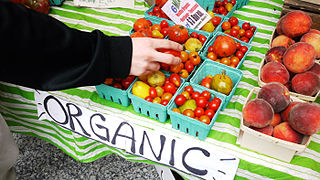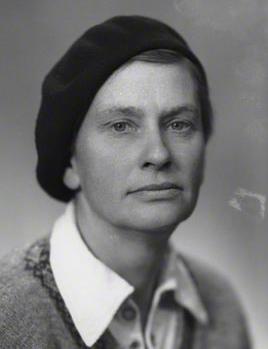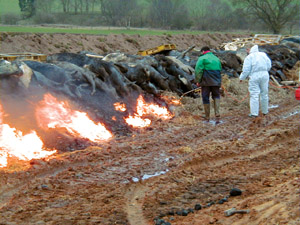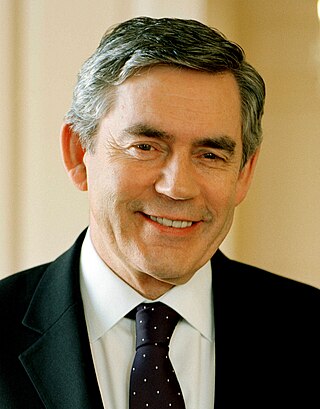Related Research Articles

The organic movement broadly refers to the organizations and individuals involved worldwide in the promotion of organic food and other organic products. It started during the first half of the 20th century, when modern large-scale agricultural practices began to appear.

The Soil Association is a British registered charity focused on the effect of agriculture on the environment. It was established in 1946. Their activities include campaigning for local purchasing, public education on nutrition and certification of organic foods, and against intensive farming.

Lady Evelyn Barbara Balfour, was a British farmer, educator, organic farming pioneer, and a founding figure in the organic movement. She was one of the first women to study agriculture at an English university, graduating from the institution now known as the University of Reading.

The outbreak of foot-and-mouth disease in the United Kingdom in 2001 caused a crisis in British agriculture and tourism. This epizootic saw 2,000 cases of the disease on farms across most of the British countryside. Over 6 million cows and sheep were slaughtered on farms in an eventually successful attempt to halt the disease. Cumbria was the worst affected area of the country, with 893 cases.

Free range denotes a method of farming husbandry where the animals can roam freely outdoors for at least part of the day, rather than being confined in an enclosure for 24 hours each day. On many farms, the outdoors ranging area is fenced, thereby technically making this an enclosure, however, free range systems usually offer the opportunity for the extensive locomotion and sunlight that is otherwise prevented by indoor housing systems. Free range may apply to meat, eggs or dairy farming.
John Barnard Bush was an English farmer, landowner, and Justice of the Peace. He was High Sheriff of Wiltshire for 1997, a Deputy Lieutenant of Wiltshire from 1998, and from 2004 to 2012 was Lord Lieutenant of Wiltshire.
Intensive animal farming, industrial livestock production, and macro-farms, also known as factory farming, is a type of intensive agriculture, specifically an approach to animal husbandry designed to maximize production while minimizing costs. To achieve this, agribusinesses keep livestock such as cattle, poultry, and fish at high stocking densities, at large scale, and using modern machinery, biotechnology, and global trade. The main products of this industry are meat, milk and eggs for human consumption.

A sustainable food system is a type of food system that provides healthy food to people and creates sustainable environmental, economic, and social systems that surround food. Sustainable food systems start with the development of sustainable agricultural practices, development of more sustainable food distribution systems, creation of sustainable diets, and reduction of food waste throughout the system. Sustainable food systems have been argued to be central to many or all 17 Sustainable Development Goals.

Organic food, ecological food, or biological food are foods and drinks produced by methods complying with the standards of organic farming. Standards vary worldwide, but organic farming features practices that cycle resources, promote ecological balance, and conserve biodiversity. Organizations regulating organic products may restrict the use of certain pesticides and fertilizers in the farming methods used to produce such products. Organic foods are typically not processed using irradiation, industrial solvents, or synthetic food additives.
New Year Honours were granted in the United Kingdom and New Zealand at the start of 2005. Among these in the UK were knighthoods awarded to Mike Tomlinson, the educationalist; Derek Wanless, who led a review of the National Health Service; and Brian Harrison, editor of the Oxford Dictionary of National Biography. The former athlete Kelly Holmes was made a Dame. The television presenter Alan Whicker was awarded a CBE.

Agriculture in the United Kingdom uses 70% of the country's land area, employs 1% of its workforce and contributes 0.5% of its gross value added. The UK currently produces about 54% of its domestic food consumption.
Animal-free agriculture, also known as plant agriculture, plant-based agriculture, veganic agriculture, stockfree farming, plant farming or veganic farming, consists of farming methods that do not use animals or animal products.
The environmental impact of agriculture is the effect that different farming practices have on the ecosystems around them, and how those effects can be traced back to those practices. The environmental impact of agriculture varies widely based on practices employed by farmers and by the scale of practice. Farming communities that try to reduce environmental impacts through modifying their practices will adopt sustainable agriculture practices. The negative impact of agriculture is an old issue that remains a concern even as experts design innovative means to reduce destruction and enhance eco-efficiency. Animal agriculture practices tend to be more environmentally destructive than agricultural practices focused on fruits, vegetables and other biomass. The emissions of ammonia from cattle waste continue to raise concerns over environmental pollution.

The 2010 Dissolution Honours List was issued on 28 May 2010 at the advice of the outgoing Prime Minister, Gordon Brown. The list was gazetted on 15 June.
The Birthday Honours 2004 for the Commonwealth realms were announced on 11 June 2004 for the United Kingdom, New Zealand, the Cook Islands and elsewhere to celebrate the Queen's Birthday of 2004.
The term farm assurance was first used in Scotland in the late 1980s to describe new certification schemes established by farmers, meat processors, consumers and supporting agencies, in response to emerging consumer concerns about food production. These schemes introduced independent, on-farm auditing of animal welfare, environmental care and staff competence.
Philip John Lymbery is the Global CEO of farm animal welfare charity, Compassion in World Farming International, Visiting Professor at the University of Winchester’s Centre for Animal Welfare, President of Eurogroup for Animals, Brussels, founding Board member of the World Federation for Animals and a Leadership Fellow at St George's House, Windsor Castle.
Pam Alexander OBE was a British businesswoman and senior civil servant specialising in housing and economic regeneration in England. She chaired the Heritage Alliance and Commonplace, a digital community engagement company; and was a non-executive director of the London Legacy Development Corporation (LLDC) and of the Connected Places Catapult. Earlier, she was chair of the Covent Garden Market Authority, and a trustee of the Design Council. She was Chief Executive of the South East England Development Agency (SEEDA) from 2004 to 2011, and of the Historic Buildings and Monuments Commission for England from 1997 to 2001. She was made OBE in 2012 for her services to urban regeneration in the South East.
The 2022 Queen's Birthday Honours are appointments by some of the 15 Commonwealth realms of Queen Elizabeth II to various orders and honours to reward and highlight good works by citizens of those countries. The Birthday Honours are awarded as part of the Queen's Official Birthday celebrations during the month of June. They were announced on 1 June 2022, in anticipation of the Queen's Platinum Jubilee. They were the last honours granted by the Queen before her death on 8 September 2022.
The 2023 New Year Honours are appointments by some of the 15 Commonwealth realms to various orders and honours to recognise and reward good works by citizens of those countries. The New Year Honours are awarded as part of the New Year celebrations at the start of January and those for 2023 were announced on 30 December 2022.
References
- 1 2 3 Taylor, Jerome (31 January 2011). "Helen Browning: A woman who won't be cowed in the war against titan farms" . The Independent . Archived from the original on 9 May 2022.
- ↑ "Report of the Policy Commission on the Future of Farming and Food" (PDF). National Archives. January 2002. p. 4. Archived from the original (PDF) on 12 November 2009. Retrieved 24 December 2017.
- 1 2 "Chief Executive". Soil Association. Archived from the original on 16 February 2012.
- ↑ Deputy Lieutenant Commissions: Lieutenancy of Wiltshire, London Gazette. 20 February 2015.